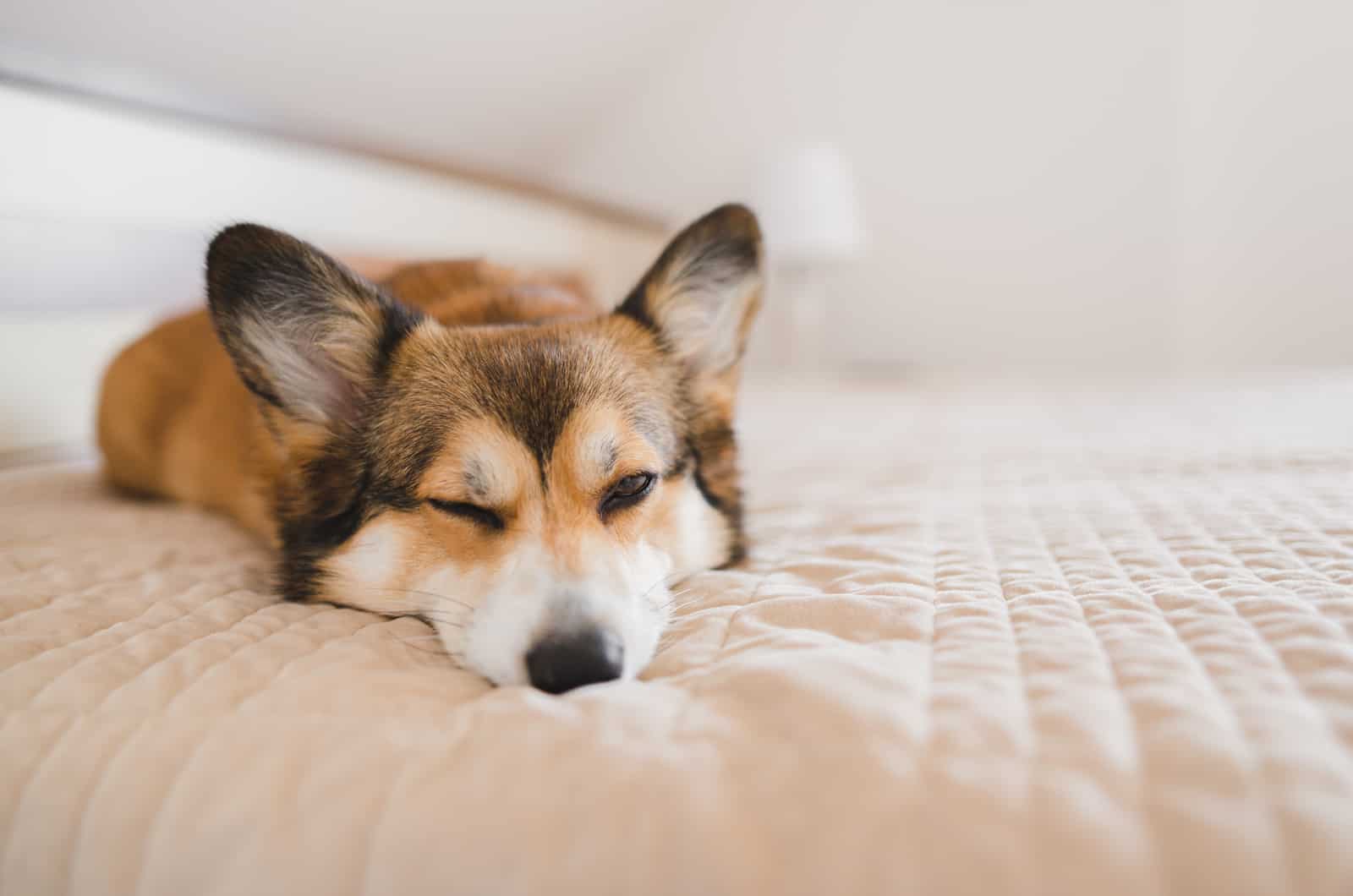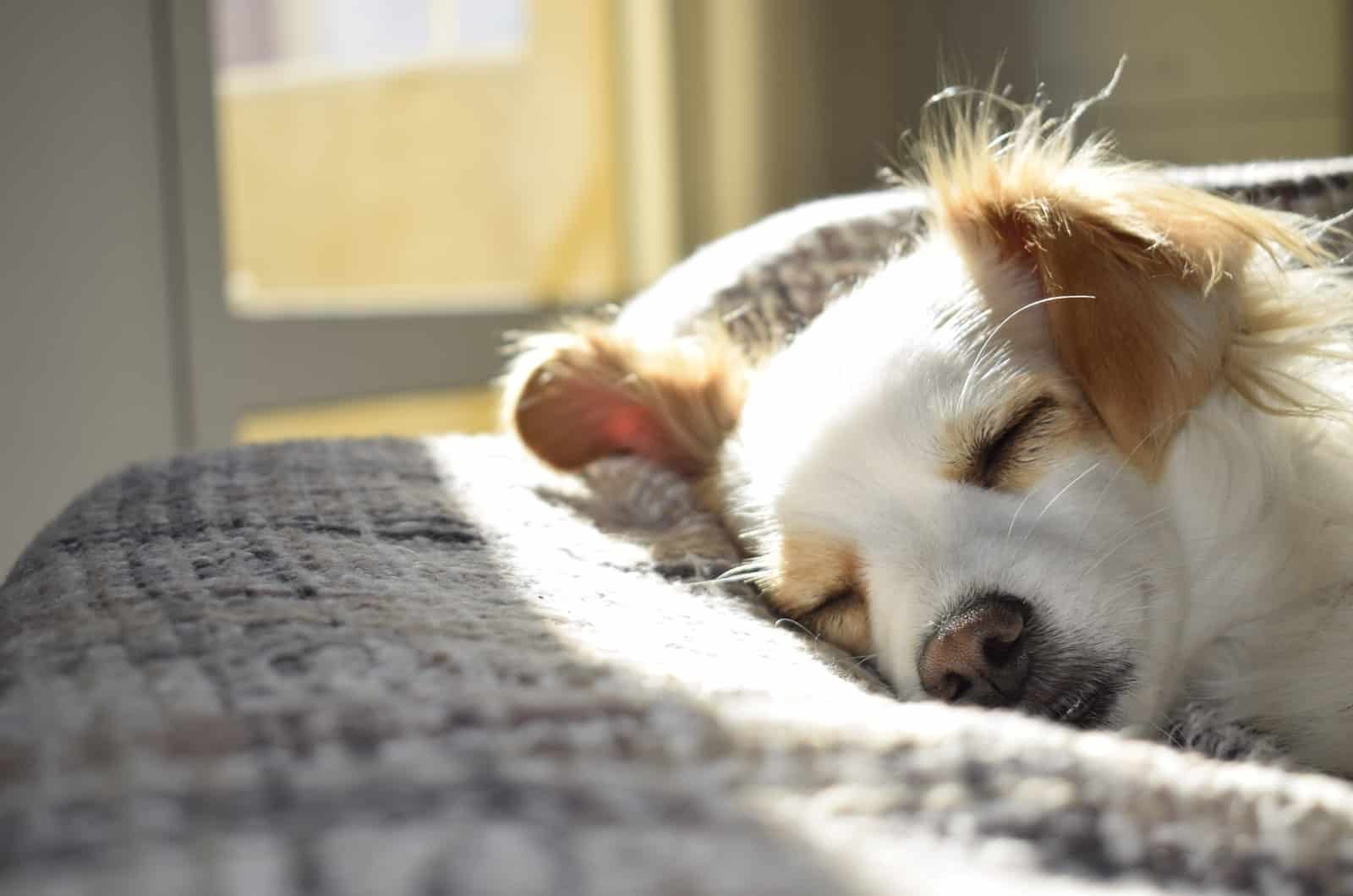It is easy to assume why your dog snores if you have a Pug or a Frenchie. But, what if you have a dog that has no brachycephalic traits? What if your Collie or German Shepherd snores?
And, more importantly… what if they only recently started to snore?
This imposes the question: is everything alright with my dog?
There are 9 reasons why your dog snores.
From anatomical innate issues to idiopathic enlargement of the nasal tissue – let’s find out why this sometimes quite annoying issue happens.
Maybe if you find out the reason, you can also find out how to fix it and help your dog and yourself have a calm and relaxing night.
Unless you have more than a snoring dog… maybe your dog prefers to chew his toy right next to your bed while you try to sleep.
Nothing is as loud as a chewing noise during the night.
Why Does My Dog Snore?

Snoring and chewing jokes aside, dogs that develop snoring issues without any anatomical predisposition for it should be examined.
Something has changed in the way the air flows through the upper respiratory tract of your dog. That’s why snoring happens.
To be precise: snoring is the sound produced when airflow goes through narrow passageways and causes the surrounding tissue to vibrate.
People snore for the same reason as dogs. There is something that is making the passage through which the air flows narrower. The air has nowhere else to go but to hit the “obstruction” and make the snoring sound.
But, why does your dog snore?
Let’s see the possible reasons…
1. Brachycephalic Dogs

I will start with brachycephalic dog breeds right away because in most cases, these are the dogs that often have snoring issues.
Some of these dogs are quite famous, like Pugs, Bulldogs, Frenchies, etc.
They were all born with the same problem: their face is flat, their nose passages are short, and they have excessive upper-respiratory tract tissue.
All of these cause the same problem that we are talking about – snoring. However, depending on how flat the face is, or how much excess tissue they have that covers the larynx, consequential breathing problems differ from dog to dog.
This means not all brachycephalic dogs have to snore. Some have breathing problems during the day as well; others, like Frenchies, snort a lot, and have other similar issues.
2. Sleeping Position
Let’s be honest… we can also produce snoring sounds when we are too tired, sick, or when we choose a sleeping position that restricts the airflow.
It is the same with dogs – specific sleeping positions can cause them to snore. What happens is that the nasopharyngeal tissue and tongue temporarily (while in this position) obstruct the air passageway.
The product is snoring sounds that can be more or less loud.
This can happen to all dogs, no matter the breed, age, tiredness, or health condition. It is more common in dogs with a shorter nose and health issues, but this is not a rule.
What do you do? Turn your doggy on its side.
3. Overweight Dogs

In my personal opinion, dogs should not be overweight no matter how cute some people might think they look. Even fluffy dogs that we are used to seeing as being overweight is bad, like a trend that happened a few years ago called fat Corgi.
Overweight dogs can develop many health problems – not just the snoring issue.
But, yes… snoring is also one of them. This happens because the fat tissue around the dog’s neck makes pressure on the airways and restricts the airflow.
The same thing happens – the dog snores.
What do you do? Your doggo needs to go on an eat-less and eat-healthier diet.
Read Next: 8 Week Old Puppy Breathing Fast While Sleeping
4. Inflammation
If your dog suffers from a bacterial or viral inflammation of the upper respiratory tract tissue, the outcome of the “fight” between the cells of the dog’s immune system and the bacteria or virus is swelling of the mentioned tissue.
It is a normal process that happens in every inflammation all around the body. Other signs of inflammation include:
- Rubor (redness of the tissue)
- Calor (elevated temperature of the tissue)
- Dolor (pain)
- Functio laesa (loss of function)
The last, fifth symptom of the inflammation is the swelling of the tissue. This swelling causes obstruction and snoring.
The inflammation has to be treated by a professional.
5. Allergies

A dog that has an allergic reaction can be a reason why you hear him snore. The “problem” is similar to the inflammation of the nasopharyngeal tissue.
In this case (allergies), the immune system cells fight an allergen and cause swelling of the surrounding tissue.
The allergen can be anything from food to smells.
However, the most common allergens are food ingredients, flea bites, mites, and pollen. Dogs with brachycephalic anatomical structures are more prone to developing allergies.
If you think your dog might be allergic, there are tests you can do to see if that is true, and if it is true, what is the allergen.
6. Growths
Basically, any type of growth that causes restriction of the airflow can potentially cause dogs to start snoring.
These growths can either be benign or malignant. It doesn’t matter which way it is, they cause the same problem. However, the treatment is different.
As you already know, malignant growth has a more uncertain treatment outcome.
7. Trauma

Any type of trauma on the nasopharyngeal tissue can cause swelling. This is usually caused by physical trauma by a foreign object. The object can either be stuck in the throat or it can injure the tissue while passing by.
It is important to know that trauma can lead to secondary infection if not treated or if the dog’s immune system is compromised.
You might also notice other signs, such as your dog gagging, coughing, or sneezing a lot.
If you notice your dog also has eating problems, take him to the vet.
They can X-ray your dog, and see what the problem is and where it is.
8. Dental Problems
If your dog has a tooth abscess or a growth in the oral cavity or in the sinuses, they can also cause problems and restrict airflow.
Dogs can’t tell us they have a tooth problem, which means you will have to look out for these signs:
- Drooling more than usual
- Avoiding food
- Rubbing its face on the ground
- Less active than usual
Use a flashlight and take a look inside your dog’s mouth. Look for any kind of unusual growth, loose tooth, swelling, redness, or other different coloration of the oral tissue.
9. Hypothyroidism

Snoring is one of the first signs of hypothyroidism. This health condition means your dog’s thyroid gland is not producing enough hormones, which are essential in metabolism regulation. Other signs of hypothyroidism are:
- Weight gain
- Lethargy
- Dry and thin fur
- Cold intolerance
If you see these or some of these symptoms in your dog, taking him to the vet is the only way for a proper diagnosis. Veterinarians can do blood tests where they check cholesterol levels. The cholesterol blood level is high when a dog suffers from hypothyroidism.
What Can You Do?

The treatment of snoring in dogs depends on the cause. If the reason is a tooth abscess, the treatment would be removing the abscess and taking care of any other problematic teeth.
Other reasons can be more difficult to solve.
Growths, hypothyroidism, inflammation, etc. require longer treatment.
On the other hand, a sleeping position can be solved at home: use pillows to elevate your dog’s head and stop the tissue from closing the airways.
Whatever the reason is, you have to check with your vet first to be certain what the problem is.
The Conclusion
A snoring dog can be annoying, especially at night when we try to get some rest before the new day. But, it is much more important to know why they snore.
This way, we can try to help our dogs, and possibly completely solve the snoring problem. However, when it comes to brachycephalic dog breeds, these issues are, in most cases, permanent.
There are some surgical treatments, but you have to be prepared that there is a chance they won’t be successful or that the problem can reoccur.
The important thing to remember is that our dogs’ health is what’s important. If there is nothing wrong with them… if they simply have such anatomical structures, you will have to get used to hearing your dog snore.
